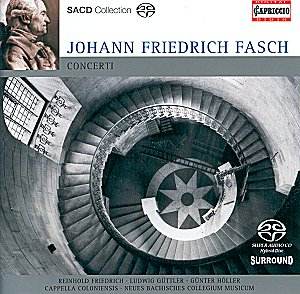During
the early 1930s Andrès Segovia and Fritz Kreisler shared a concert
in which Segovia presented music by Leopold Silvius
Weiss. Kreisler later asked: “Where did you get that piece?”
to which Segovia replied “The same place you got yours.”
This
seemingly cryptic exchange related to pastiches written for
the guitar by Manuel Ponce and attributed to Weiss (among others).
Kreisler had also played a number of his own compositions in
concerts but attributed them to such composers as Pugnani and
Vivaldi.
Some
three centuries earlier Johann Friedrich Fasch, was also composing
music that he had presented under someone else’s name. During
Fasch’s days as a law student he composed an orchestral suite
and passed the work off at a Collegium Musicum session as that
of Telemann. His fellow students thoroughly enjoyed the music
and no one suspected his little subterfuge. He unequivocally
demonstrated his own ability to compose in a style equivalent
to a leader of the day.
Fasch
was born in Buttelstedt in 1688. He joined the court chapel
of the Duke of Weissenfels as a choirboy. Here his teacher was
Johann Philipp Krieger, a musician of wide culture and well
versed in the Venetian, Bolognese, Neapolitan, Florentine and
Roman schools; he was also acquainted with the musicians of
old Bohemia. Krieger was a pupil of Pasquini and had influence
of importance on the young Fasch; no less decisive was the sway
of Johann Kuhnan at the Thomas-Schule in Leipzig where Fasch was to be found in 1701.
In
1722 Fasch became Kapellmeister of the Court of Zerbst. Tradition
has it that in that same year he refused to compete against
J.S. Bach for the post of Cantor at the St. Thomas’s church of Leipzig. Bach
likewise held him in high esteem as witnessed by copies of five
suites by Fasch found among Bach’s manuscripts.
The
music of Fasch, perhaps more than that of any other baroque
composer, marks the transition from baroque to rococo or early
classical. His music is challenging to categorize in stylistic
terms. A 1743 inventory of Zerbst’s court library boasts copies
of the latest concertos by Vivaldi, Albinoni and Bonporti as
well as manuscript copies of sonatas by Locatelli, Volumier
and Handel. This shows how keen Fasch was to keep up to date.
Although
Fasch belongs time-wise to the baroque period, his lifespan
paralleling that of J.S. Bach, on listening to a cross-section
of his works one may wonder which member of the Bach family
his music most closely resembles: J.S. Bach, baroque- inclined
Wilheim Friedemann or forward-looking Carl Philipp Emanuel.
More
readily recognisable in his music is the emancipation of wind
instruments. Also evident is the increased interest in syncopated
rhythms, and chromatic inflections. His harmony tends to be
richer than that of most composers of the time and without the
complexities of J.S. Bach.
The
works of Fasch, in manuscript, are dispersed among numerous
libraries throughout Europe. In addition to a quantity of concertos,
overtures, sonatas and symphonies he is credited with at least
one Passion, fourteen masses, two credos, four psalms, some
one hundred church cantatas, four serenades and four operas.
Despite
his prodigious output there is a general paucity of recorded
music by Fasch. Even the prolific Naxos
has only managed two inclusions in their discography for this
composer.
The
review disc from Capriccio presents five Fasch concerti. They
offer an overview of his instrumental music. Particularly significant
is the “Concerto a due cori in B flat” [1-6]. This is an instrumental
suite on a grand design. With its attractive mixed arrangement
for contrasted winds and strings (a due cori) it fits the type
of “Concert overture” that Johann Adolph Scheibe refers to in
his “Critical Musician” (Leipzig
1745).
The
programme on the review disc is well chosen and exemplifies
the aforementioned characteristics of Fasch’s composing style:
rich harmonies, conspicuous wind instruments and syncopated
rhythms. This is beautiful music that satiates the human ear’s
innate harmonic affinities.
Overall
the performance is very good but does not supplant that of the
English Concert with Trevor Pinnock, a 1995 recording also of
five concerti by the same composer (Archive 449 210-2), which
in all aspects is quite outstanding.
Capriccio’s
new release of concerti by Johann Friedrich Fasch is recommended
listening. It is, however, not the best available recorded example
of this important and under-recorded baroque composer.
Zane
Turner

![]() for
details
for
details ![]() Reinhold Friedrich, Alain De Rudder, trumpet; Zoltan Varga, Lehel Ronai,
horn; Lajos Lencses, Laszlo Parkanyi, oboe; Aladar Tüske, bassoon; Budapest
Strings
Reinhold Friedrich, Alain De Rudder, trumpet; Zoltan Varga, Lehel Ronai,
horn; Lajos Lencses, Laszlo Parkanyi, oboe; Aladar Tüske, bassoon; Budapest
Strings![]() CAPRICCIO SACD 71 049
CAPRICCIO SACD 71 049 ![]() [55:52]
[55:52]












